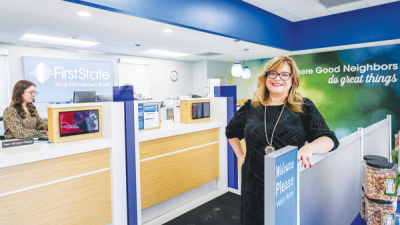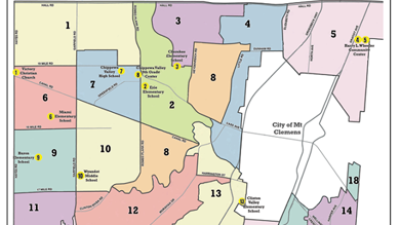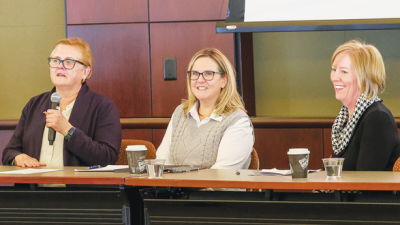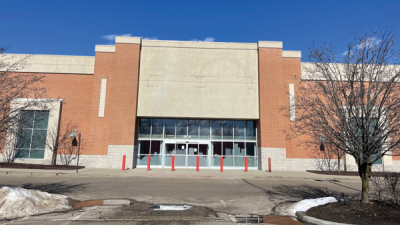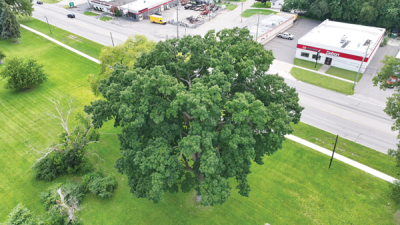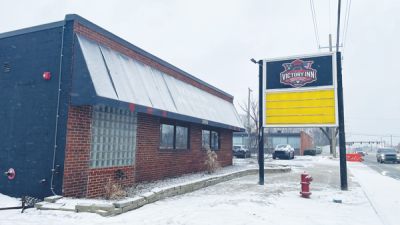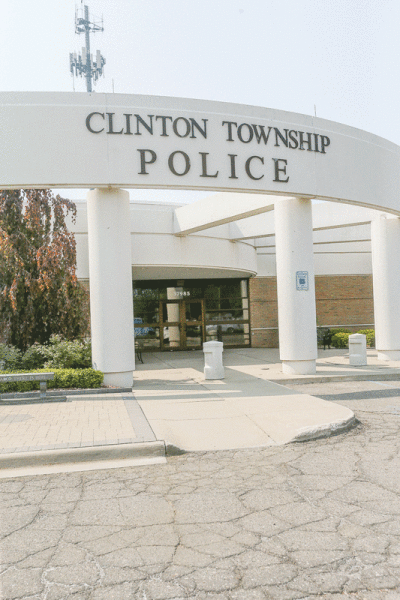
On May 8, the Clinton Township Board of Trustees voted 5-1 to apply for a grant that would enable the township to establish a traffic unit.
Photo by Patricia O’Blenes
CLINTON TOWNSHIP — At its meeting on May 8, the Clinton Township Board of Trustees voted to pursue a grant that would allow the Police Department to establish a traffic unit.
Provided through the U.S. Department of Justice’s Office of Community Oriented Policing Services, the COPS Hiring Program grant would provide funding to hire four additional officers at a rate of $125,000 per officer for three years. Chief Dina Caringi and Capt. Preston Susalla, of the Clinton Township Police Department, approached the board with the intention of using the funds to boost the department’s traffic and community policing capabilities through the creation of a traffic enforcement bureau.
“The traffic bureau is a win-win for our department and for the community because (officers) are able to spend some really significant time in some of these problem areas getting to know the community (and) the residents, the neighborhoods (and) enhance our community relations in that aspect,” Caringi said. “It is to increase driver safety through enforcement, sure, but we also have an opportunity to grow as far as providing education.”
Some of the community education ideas Caringi suggested include having the grant-hired officers go to high schools and give presentations. The officers could also be positioned around the township to increase the department’s presence. Susalla recounted a time from when he was part of the department’s former traffic bureau, when being out in the community allowed him to build relationships with residents, which sometimes led to residents offering him coffee.
Trustee Mike Keys, having looked over the department’s priorities for the grant and comparing it to the COPS grant’s wording, was unsure if putting the funds toward a traffic bureau would be in line with the goal of improved community policing.
“This really, to me, should be used as a way to think outside of the box in community engagement and not the typical traffic situation in a neighborhood, meeting those that are willing to come give (officers) a coffee,” Keys said. “What I really want to see is those residents that aren’t comfortable with you to come knock on your window and give you a coffee.”
Some of the applications Keys suggested were holding gun-buyback programs and giving auto part waivers in place of some tickets. Trustee Tammy Patton supported Keys’ suggestions, while also imploring the department to look into ways of enforcing traffic laws without utilizing officers, such as radar speed detectors. Township Supervisor Robert Cannon requested the department come back to the board every year to evaluate the effectiveness of the officers if awarded the grant.
The board approved a grant submission with a 5-1 vote, with Keys providing the only “no” vote. Trustee Julie Matuzak was not at the meeting.
Zoning code amendments
The board also approved amendments to the township zoning code, including the creation of the Groesbeck Overlay District.
The updates were made by planning firm MKSK with the goal of making the code more “user-friendly,” including streamlining sections, revising definitions, clarifying the responsibilities of the building and planning departments and creating an overlay district to govern work on commercial and industrial properties along the M-97 corridor.
“The goal is to ensure the corridor is more consistent and (to) help beautify the corridor,” said Ann Marie Kerby, a senior associate at MKSK. “The standards that we have in there include higher quality building materials, looking for better pedestrian connections, lighting and then we also have landscaping and screening standards built in there as well.”
Township Clerk Kim Meltzer praised the inclusion of electric vehicle charging standards.
Treasurer Paul Gieleghem asked how the updated code could help attract businesses to the southern parts of the township, and Township Planning Director Bruce Thompson said a streamlined code is more attractive to developers and businesses than a code that is hard to navigate.
CDBG allocations
The board also approved the Community Development Block Grant allocations for 2023.
The nearly $650,000 provided by the Department of Housing and Urban Development is split between administrative, public service and miscellaneous uses.
Macomb Community Action received the highest amount of public service funds at $12,500; Turning Point, Advancing Macomb, Care House, Interfaith Volunteer Caregivers and MCREST each received $5,000; and the township senior center received $4,000. A total of $121,901 was put toward administrative costs, with an additional $8,000 going toward fair housing testing. In the miscellaneous uses category, $220,605 was put toward housing rehabilitation; $212,500 was put toward bringing sidewalks and curbs up to Americans with Disabilities Act standards; and $45,000 was put toward improving the senior center.
 Publication select ▼
Publication select ▼



